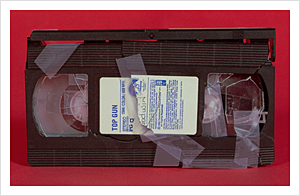 The U.S. House of Representatives recently passed legislation that will, if it becomes law, make it easier for companies and users to share video viewing habits.
The U.S. House of Representatives recently passed legislation that will, if it becomes law, make it easier for companies and users to share video viewing habits.
The current law, adopted in 1988 as the Video Privacy Protection Act (VPPA), requires written consent for rental information to be shared — which is nearly impossible for companies like Netflix or Facebook to accommodate. As a post on Wired.com points out, the VPPA also “requires the user to separately consent to each disclosure, which some users might find annoying.” Annoying, yes, but also so cumbersome for all involved that it makes sharing more trouble than its worth.
The new legislation looks to change this. The Wired post explains that it will “tweak the Video Privacy Protection Act to allow users to consent to video sharing over the web. It would also allow users to consent once to all future sharing.”
The original law clearly failed to have the foresight of technological advances and, thus, had the unintended consequences of impeding consensual sharing activity. To get further insight on the new legislation and the effects it might have — intentional and otherwise — I reached out to transactional and intellectual property attorney Dana Newman (@DanaNewman). Our short interview follows.
The Video Privacy Protection Act had some unintended consequences. Do you foresee something similar for this legislation?
 Dana Newman: Just as the distribution of video has changed dramatically since the passage of the original law, it will undoubtedly continue to evolve in unforeseen ways such that the definition of a “video rental service” may become obsolete or much broader than currently envisioned. Also, the granting of a blanket consent to sharing video watching information opens up greater privacy concerns than one providing for consent to be granted on a case-by-case basis.
Dana Newman: Just as the distribution of video has changed dramatically since the passage of the original law, it will undoubtedly continue to evolve in unforeseen ways such that the definition of a “video rental service” may become obsolete or much broader than currently envisioned. Also, the granting of a blanket consent to sharing video watching information opens up greater privacy concerns than one providing for consent to be granted on a case-by-case basis.
What’s your take on what appears to be a course correction in this new legislation?
Dana Newman: The original law was written at a time when there was far less sharing of personal, consumer and media consuming information, so the impact wasn’t as pronounced as it is in the digital era. The new law takes into account the fact that video rentals have shifted online and that we now choose to publicly share our media preferences and entertainment watching/listening/reading activities. It could pave the way for less selective control over disclosure of consumers’ rental (or subscription) habits for other digital content, such as music or books.
What wider-reaching effects might this legislation have? Could it lead to updates in other areas, such as copyright?
Dana Newman: I see this as being about the licensee’s privacy around their use of the content rather than a copyright issue. We’ve already had online click-wrap license agreements for some time. But this is an example of Congress recognizing the need to update the laws to adapt to a digital distribution model for content as opposed to the physical copies/physical stores model, as many have argued is needed in the area of copyright law.
This interview was edited and condensed. Photo: VHS by mattpicturefun, on Flickr
 TOC NY 2012 — O’Reilly’s TOC Conference, being held Feb. 13-15, 2012, in New York City, is where the publishing and tech industries converge. Practitioners and executives from both camps will share what they’ve learned and join together to navigate publishing’s ongoing transformation.
TOC NY 2012 — O’Reilly’s TOC Conference, being held Feb. 13-15, 2012, in New York City, is where the publishing and tech industries converge. Practitioners and executives from both camps will share what they’ve learned and join together to navigate publishing’s ongoing transformation.
Related:
